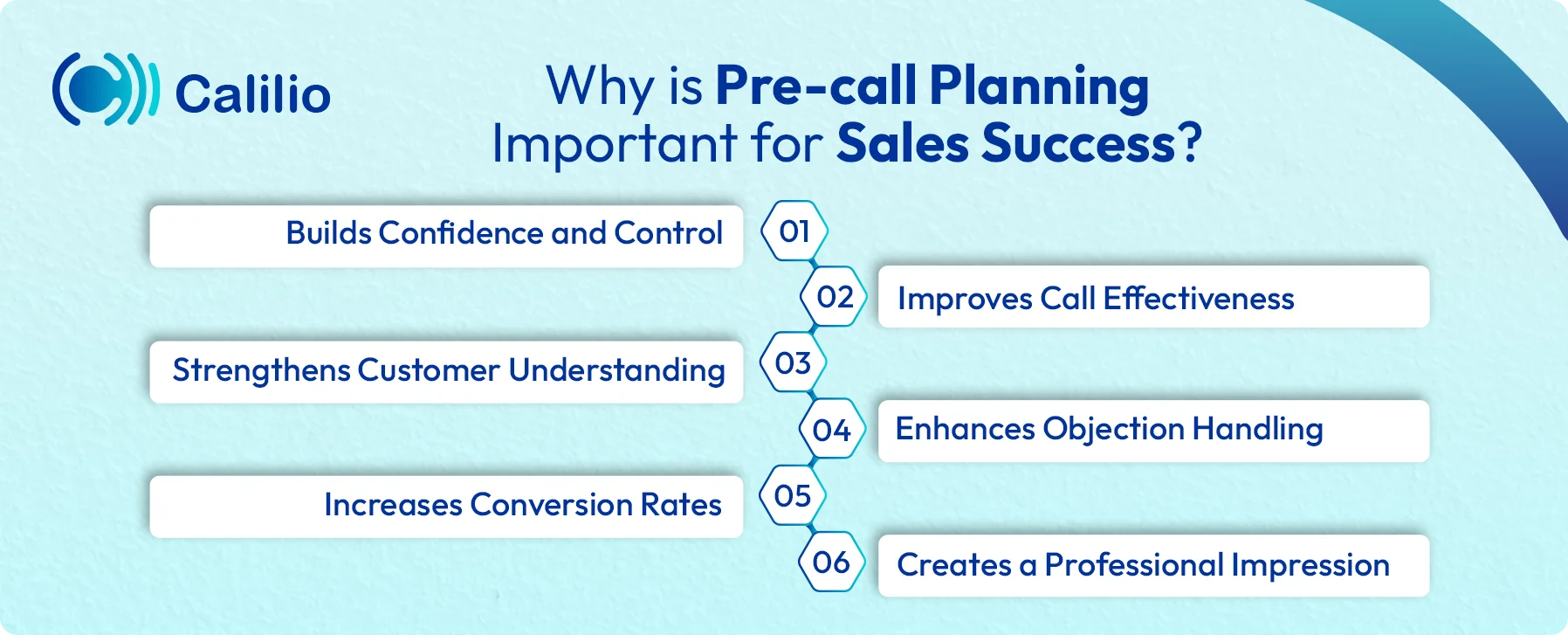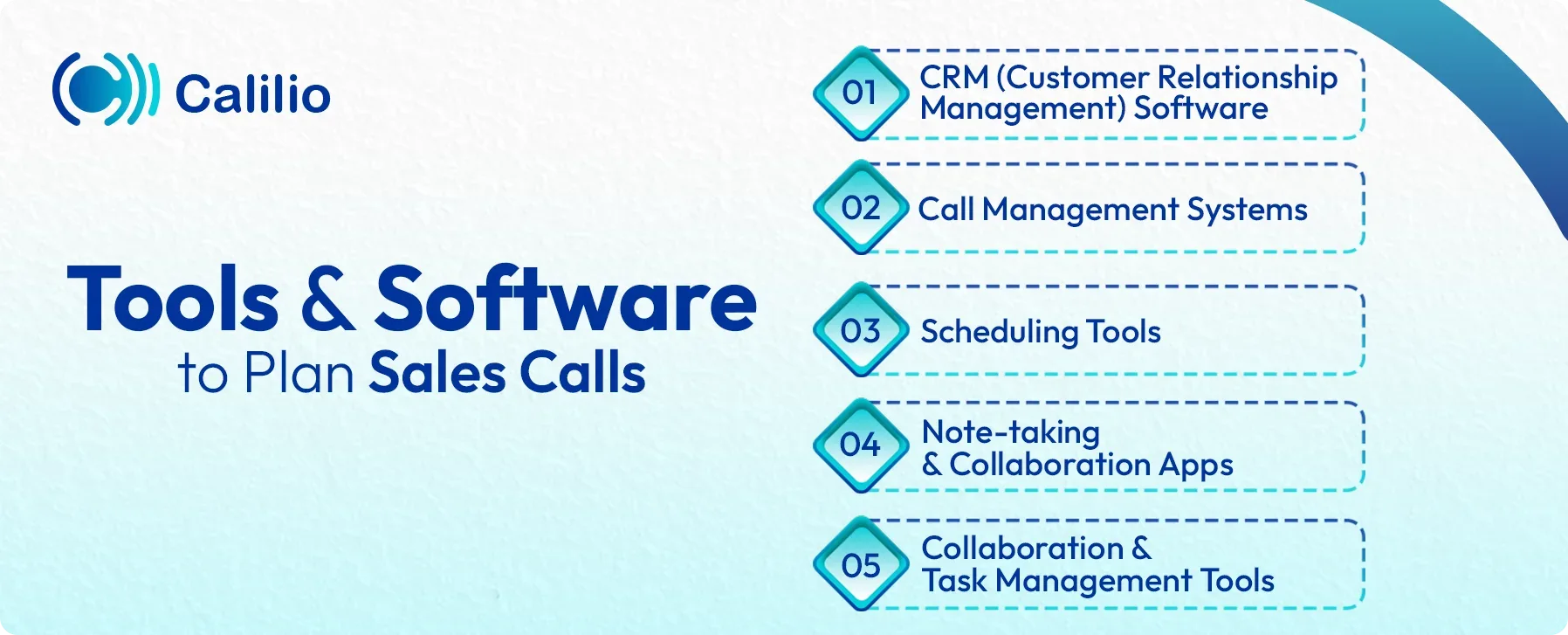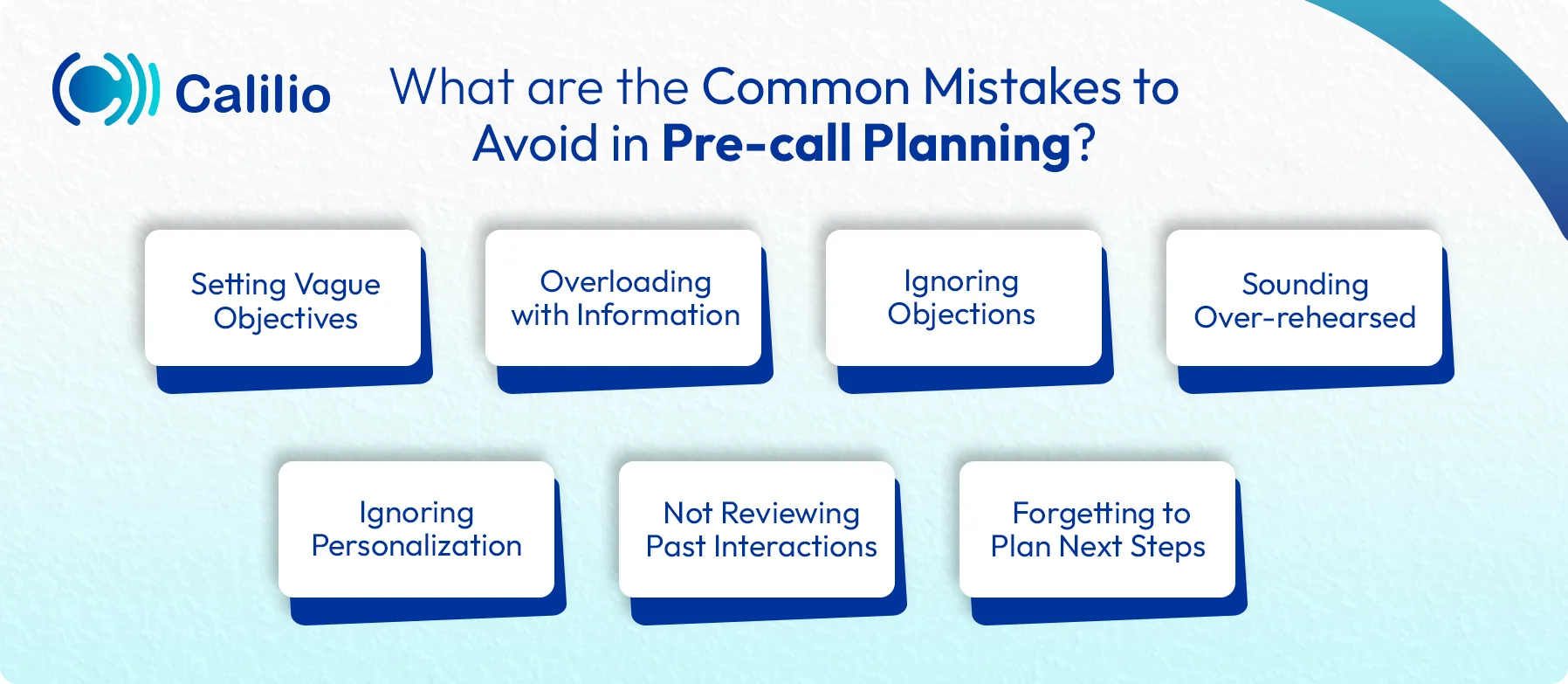Pre-call Planning for Sales Reps: Steps, Templates, & Tips

Many sales calls fail not because the product isn’t good, but because the salesperson isn’t fully prepared. Jumping into a conversation without understanding the prospect, their needs, or the call objective often leads to poor first impressions and missed opportunities.
Pre-call planning helps you prepare for a sales call ahead, understanding your prospect, setting clear goals, and anticipating challenges, so you can turn every call into a focused and productive conversation.
In this blog, you’ll learn what pre-call planning is, why it’s essential for sales success, and how to create a winning strategy using proven steps, templates, and tools.
Key Highlights:
Pre-call planning helps sales reps prepare before every conversation by researching prospects, defining goals, and structuring call flow for better results.
Effective sales call planning improves confidence, professionalism, and conversion rates by keeping discussions clear and focused.
Tools like CRM, scheduling, and note-taking simplify your process of planning calls.
Sales reps should avoid setting vague objectives, giving generic pitches, ignoring objections, and forgetting follow-ups to make their sales calls more effective and goal-driven.
What is Pre-call Planning?
Pre-call planning is the process of preparing for a sales conversation before you pick up the phone or make a call to potential clients. It involves researching your prospect, identifying their pain points, and defining what you want to achieve from the call. This preparation helps sales reps approach every conversation with structure and confidence.
Whether it’s a warm call or a cold call, effective sales call planning helps you tailor your pitch to the prospect’s needs, making the conversation more relevant and engaging. It also ensures that no important detail is overlooked, whether it’s understanding the buyer’s pain points, aligning your solution with their goals, or defining the next steps after the call.
Why is Pre-call Planning Important for Sales Success?
Pre-call planning helps sales reps stay confident, focused, and prepared during conversations. It improves call effectiveness, builds stronger customer relationships, and boosts conversion rates through structured communication.

- Builds Confidence and Control: When you plan ahead, you know what to say and can handle the conversation confidently from beginning to end.
- Improves Call Effectiveness: Having a clear plan ensures you use the call time efficiently and stay focused on the goals that move the sale forward.
- Strengthens Customer Understanding: Researching the prospect beforehand helps you understand their needs and personalize your message for better engagement.
- Enhances Objection Handling: Anticipating possible objections allows you to respond quickly and confidently without losing the flow of conversation.
- Increases Conversion Rates: Consistent preparation leads to structured, meaningful conversations that are more likely to end in a positive outcome.
- Creates a Professional Impression: When prospects see that you understand their business and have clear objectives, it establishes trust and credibility from the start.
How to Create an Effective Pre-plan for a Sales Call?
To prepare for a sales call, research your prospect, set clear objectives, and organize key talking points to guide the conversation effectively. Then, anticipate objections, plan your call flow, and end with clear next steps to keep the sales process moving forward.
1. Research Your Prospect
Start by gathering essential information about your prospect. Learn about their company, industry, recent updates, and pain points. The more you know, the easier it becomes to align your product or service with their needs.
2. Set Clear Call Objectives
Know what you want to achieve from the call. It could be booking a demo, qualifying a lead, or closing a deal. A clear objective helps you structure the discussion and measure success afterward.
3. Prepare Key Talking Points
Outline what you’ll cover during the call, your value proposition, product benefits, or customer success stories. This keeps the discussion focused and impactful.
4. Anticipate Questions and Objections
Think ahead about what your prospect might ask or object to. Prepare concise, confident responses. This helps you handle objections smoothly and keep the conversation positive.
5. Create a Call Flow
Plan how to open the call, transition into discussing their needs, present your solution, and end with clear next steps. A well-structured sales rep call plan template ensures a natural, goal-oriented conversation.
6. Prepare Supporting Materials
Have all necessary information ready, like pricing details, case studies, brochures, or product demos. Quick access to these resources shows professionalism and credibility.
7. Plan the Next Step
End every call with an action, such as scheduling a meeting, sending a proposal, or agreeing on a follow-up date. Defining the next step keeps the sales process moving forward and helps you close sales deals successfully.
Sales Pre-call Planning Template
A well-designed sales pre-call planning template helps you organize details, set clear goals, and track progress after each call. It ensures that every rep on your team follows the same winning routine, no matter who they’re calling.
Here’s a simple and structured, ready-to-use pre-call planning template that you can easily copy into Google Sheets, Excel, or your CRM or print for quick reference.
Section | Details to Fill In |
| 1. Prospect Information | Name: Company: Job Title: Industry: Contact Details: Website/LinkedIn Profile: |
| 2. Call Objective | What do I want to achieve from this call? (e.g., schedule a demo, qualify the lead, discuss pricing, follow up on a proposal) |
| 3. Key Talking Points |
|
| 4. Prospect Research |
|
| 5. Anticipated Objections & Responses |
|
| 6. Questions to Ask |
|
| 7. Call Notes/Observations |
|
| 8. Next Steps/Follow-up Actions |
|
Tools & Software to Plan Sales Calls
Sales teams use CRM, call management software, and scheduling platforms to plan calls efficiently. These tools enable better preparation, coordination, and follow-up after every sales conversation.

I. CRM (Customer Relationship Management) Software
A CRM stores customer details, call history, and deal progress. It helps sales teams view previous interactions, track opportunities, and prepare talking points before planning calls.
II. Call Management Systems
Call management tools give you control over how calls are handled and tracked. Its features, like call notes, IVR, call queue, and call analytics, help sales reps prepare better, organize conversations, and analyze call outcomes effectively.
III. Scheduling Tools
Tools such as Calendly, Google Calendar, and Outlook Calendar make scheduling and follow-ups easy. They help you avoid overlapping meetings and ensure that every sales call starts on time.
IV. Note-taking and Collaboration Apps
Digital note-taking apps help you organize important call details, meeting notes, and follow-up actions in one place. Keeping structured records ensures consistency and prevents information loss.
V. Collaboration and Task Management Tools
Team collaboration platforms help sales teams share updates, assign follow-up tasks, and monitor progress. This keeps everyone aligned and improves overall productivity.
Turn Every Sales Call Into a Win with Pre-Call Planning!
Tips to Improve Your Sales Pre-call Planning Strategy
To improve your pre-call planning strategy, focus on key prospect insights, review past call data, and personalize each conversation for better engagement. Refine it over time by listening actively and updating your pre-call planning template with lessons learned from previous calls.
- Focus on Quality, Not Quantity: Don’t prepare a long checklist for every call. Focus on a few key details about the prospect that will help guide your conversation.
- Review Call Data Regularly: Look at your past sales calls to see what worked and what didn’t, so you can spot patterns and improve your sales call planning for future calls.
- Personalize Every Call: Tailor your message to the specific prospect. Use their name, mention their company’s challenges, or refer to recent updates.
- Practice Active Listening: Stay fully present during the conversation to identify opportunities and adjust your approach in real time.
- Update Templates Frequently: Your pre-call planning template should evolve with experience. Update it with new insights, refined questions, and improved responses from past calls.
What are the Common Mistakes to Avoid in Pre-call Planning?
Sales reps should avoid vague objectives, generic messaging, and overlooking past interactions during pre-call planning. Reps also lose impact when they overload prospects with details, ignore objections, or forget to plan follow-ups.

- Setting Vague Objectives: Without a clear goal, your call can easily go off track and fail to produce results.
- Overloading with Information: Sharing too much information at once can confuse or overwhelm the prospect.
- Ignoring Objections: Failing to anticipate objections may cause hesitation when tough questions come up.
- Sounding Over-rehearsed: Over-preparation can make your pitch sound scripted instead of natural and engaging.
- Ignoring Personalization: Using the same script for every prospect prevents you from building meaningful and relevant conversations.
- Not Reviewing Past Interactions: Skipping previous notes or call summaries leads to repetitive discussions and missed chances to build stronger relationships.
- Forgetting to Plan Next Steps: A sales call that ends without a defined follow-up leaves the prospect uncertain and weakens your overall sales process.
Conclusion
Successful sales calls don’t happen by chance; they’re the result of thoughtful pre-call planning. When you plan your calls with clear objectives and personalized insights, you turn random interactions into purposeful, results-driven discussions that move deals forward. It not only boosts your confidence but also helps you build trust and strengthen relationships with every prospect.
With Calilio, you can take your sales call planning to the next level. Its AI-powered call reports help you review every conversation with summaries, transcriptions, and sentiment analysis—so you can refine your approach before the next call. Moreover, features like call notes, tags, and analytics make it easy to track key details, identify patterns, and continuously improve your strategy.
Summarize this blog with:
Frequently Asked Questions
How much time should a sales rep spend planning before calls?
A sales rep should typically spend 5 to 15 minutes on pre-call planning for each prospect. Complex or high-value deals may require deeper research and preparation.
What metrics should you track post-call to improve planning?
What are common objections sales reps must prepare for ahead of time?

Still have questions?
Can’t find the answer you’re looking for? Please chat with our friendly team.
Stay in the loop
Get the latest call insights, trends, and updates delivered straight to your inbox.
By subscribing, you agree to receive updates from Calilio.
You can unsubscribe anytime.
